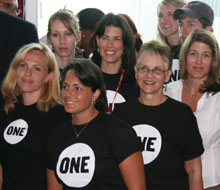 A few comments on some recent articles have been especially inspiring. I like to think that if nothing else, most of the writing on this site is committed to reality. And not grim, dour, and pessimistic reality with a “there’s nothing we can do about it” mindset that assumes we are mere automatons in a machinated world. But we strive to be grounded in reality because we hold the conviction that the truth is invaluable in solving social problems. The assumption here is that the world’s persistent ills are not solved by romantic, catch-all solutions that promise everything and do little, but by accepting the reality that surviving and thriving in the world is the result of working, doing our part, and, especially, learning from history.
A few comments on some recent articles have been especially inspiring. I like to think that if nothing else, most of the writing on this site is committed to reality. And not grim, dour, and pessimistic reality with a “there’s nothing we can do about it” mindset that assumes we are mere automatons in a machinated world. But we strive to be grounded in reality because we hold the conviction that the truth is invaluable in solving social problems. The assumption here is that the world’s persistent ills are not solved by romantic, catch-all solutions that promise everything and do little, but by accepting the reality that surviving and thriving in the world is the result of working, doing our part, and, especially, learning from history. So when I write about the fallacy of the “all you need is love” mantra or the over-reliance on “justice” instead of “mercy” as a concept for helping others, it is this realistic worldview I am appealing to. Thus, the following slogan that appeared in a comment struck me again at the way we continually delude ourselves, the way our best intentions often die like a fish out of water, and the way the arrogance of our modern age drives sacred and secular culture alike to make promises it cannot possibly keep. “One Spirit. One Will. Zero Poverty” is the slogan of Bread for the World (bread.org), a massive non-profit whose stated goal is to seek “justice for the world's hungry people by lobbying our nation's decision makers.” (There’s that justice word again.)
Certainly, Bread for the World may do a great deal of good work, and may seek to follow the example given by Jesus Christ when he fed the poor. I will give Bread the BFTW the benefit of the doubt that its intentions are good and godly, performed out of compassion generated by seeing truly suffering people. It’s not the intentions I question, but the stated goal. This phrase, this implied promise, “zero poverty,” strikes me as so beyond the pale, it makes me wonder what the real intentions of BFTW are. Who of truly noble intent has ever made such promises, or has even considered such an impossible goal to be possible? Even Jesus (who even secular folks would find it hard to argue was an exceptionally charitable person) never promised utopia this side of heaven, even as he fed four or five thousand at a time with a few fish and loaves. The number of charlatans and dictators that have made such promises is striking, however. And BFTW’s goal is centered squarely in a materialistic framework, but has the audacity to assume spiritual understandings of “justice” to make their work appear like it is solely inspired by Jesus-loving piety.
If the adage that “it is better to tell a big lie than a little lie” is correct, BFTW is certainly telling a whopper. Even if by their math they have number-crunched the wealth of the world against the hungry of the world, and by their idealistic ways of thinking they can see how there could no longer be poverty, who would actually believe that upping the federal budget here will get the money into the hands of the poor in “developing” nations? The power is not in the legislation, but in the distribution. All of the hopes and dreams for zero poverty go out the window as soon as a middleman gets involved and funnels American taxpayers to warlords in a corrupt country.
All of this pie-in-the-sky thinking about “zero poverty” is a misguided waste of time. To create real wealth for people hinges not on the good intentions of wealthy countries like the US, but on the rule of law in those that are poor. Without property rights, relatively clean government, and enough virtue in the culture to abide by the ever-fragile reliance on the law, we should never expect anything but poverty. Basic economics suggests and real history has proved that poverty is never eradicated by BFTW’s ridiculous solution to attain “zero poverty”: upping America’s federal budget and giving the money to politicians in poor countries. We’ll only be empowering corrupt leaders who keep the poor subjugated as it is.
So let’s stick with reality. Forget zero poverty. Let’s tighten the scope, get a little more myopic, help those we can most easily help. If you want to help the poor in third world countries, give them goats, cattle or dig them a water well. The Church here could start by helping those who are dependent on such government aid to become self-sufficient (in an economic sense, not a theological one). Perhaps BFTW could attempt to create “zero poverty” in their own neighborhood before having the arrogance to tell Congress what to do. Or hey, just read up on failed socialist/communist economies of the past. A little history lesson would make slogans like BFTW’s all but impossible to ever consider.

No comments:
Post a Comment